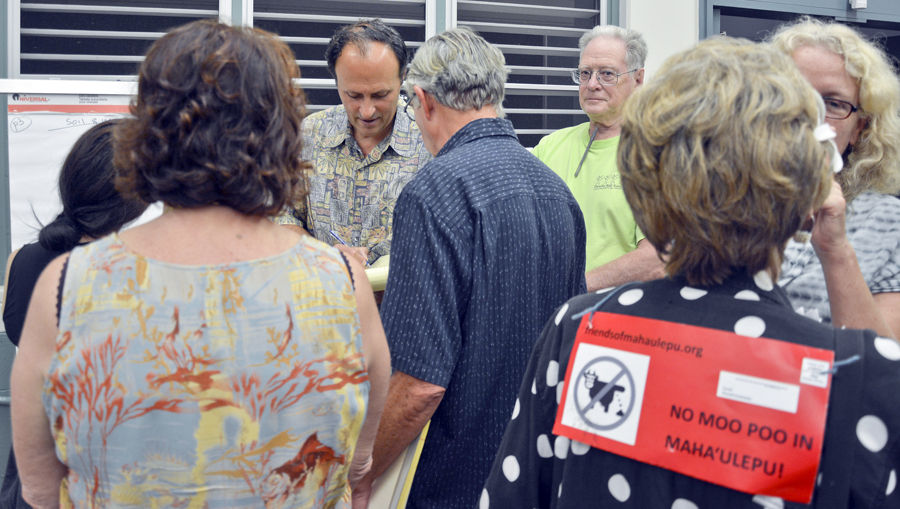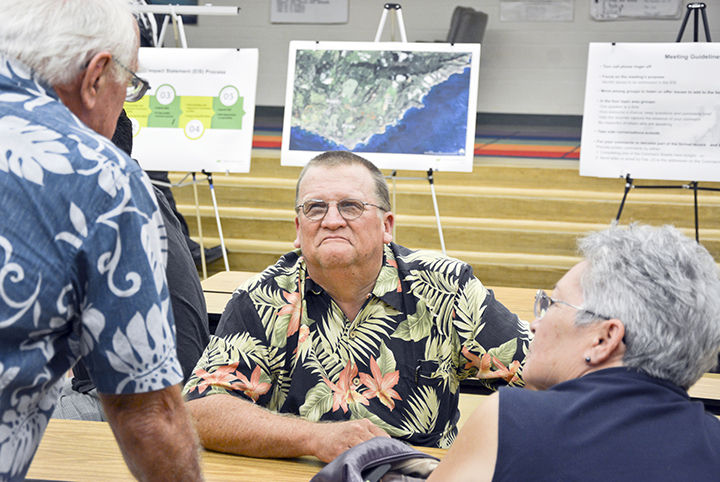KOLOA — Longstanding tensions surrounding a proposal to construct a grass-fed dairy in Mahaulepu resurfaced on Thursday, when nearly 150 people packed into the Koloa Elementary School cafeteria.
“I don’t believe they have really researched the consequences of the situation with the waste,” said Kapaa resident Sharon Mitchell. “I also think the water quality is a huge, huge concern.”
Puhi resident Susan Fukumoto supported the plan.
“Here’s somebody who has tremendous resources and advanced thinking and is trying to bring modern agriculture to a rural community,” she said. “I want to see this community stay rural and not so much based in the tourism industry.”
Hawaii Dairy Farms officials say the meeting was a step toward a voluntary review process that will help them determine if their proposal to operate a 699-herd dairy farm on 578 acres of leased lands is feasible and can accommodate up to 1,301 more as a part of the facility’s original plans.
“This project is really about food sustainability and it’s using the lands that all of us across the state have decided are important agricultural lands, and continuing that use,” said Jeff Overton, a principal planner with Group 70 International, Inc., the Honolulu-based planning and engineering firm charged with conducting an environmental impact assessment on the project.
He said the plan is based on “the science of today toward what a sustainable dairy operation really could be.”
“Because this is an agricultural project on land that’s zoned by the state and the county as agricultural land, they really don’t need to do an EIS, but they’ve decided to do one voluntarily because it’s important to address what are the potential impacts of an agricultural operation on agricultural lands,” Overton said as the standing-room only crowd responded with shouts of laughter and tense remarks.
HDF spokeswoman Amy Hennessey confirmed two security guards were hired for Thursday’s meeting “to ensure everyone felt safe to share.”
“We also weren’t sure how many attendees to expect, so we thought it would be helpful for making sure everyone had access,” Hennessey said.
The environmental impact statement process will take up to a year to complete.
As it is proposed, the project would accommodate about 118 fenced paddocks, about 4.5 to 5 acres each, that will be monitored for grass growth, nutrient application and cow grazing.
Other facilities planned for the dairy farm include a barn and milking parlor, cow walkways and farm roads, effluent settling and storage ponds, livestock water distribution system, storage tanks, operations buildings and office.
HDF, according to Office of Environmental Quality Control documents, will “establish the herd of dairy cows over several years guided by the results of the nutrient analysis, potentially reaching full-scale capacity of 2,000 cows for the farm.”
HDF officials have also pledged to not construct any of the dairy buildings, utilities or effluent ponds until state regulators have reviewed the EIS.
“Last night’s feedback will help define how we go forward with the studies,” Hennessey said.
Poipu resident Terrie Hayes said she does not support the idea of a dairy in Mahaulepu, which is home to several environmentally and culturally significant sites, and characterized the meeting as a “dog-and-pony show.”
“It seemed like they wanted to do their required community meeting to shake hands just days before the public comment period closed, “ Hayes said.
But opposing the dairy in Mahaulepu, Fukumoto said, comes with a key question: “What do you want to see happen there?”
The farm would be several miles away from Koloa, where Fukumoto’s husband’s family has lived for several generations and worked the land.
“If you stop farming, then this resource is going to leave the agricultural designation,” Fukumoto said. “Then we’re just going to have more elitist communities and more hotels. You have to be really careful about what you wish for. If you want to stop the dairy I don’t think that’s the answer.”




